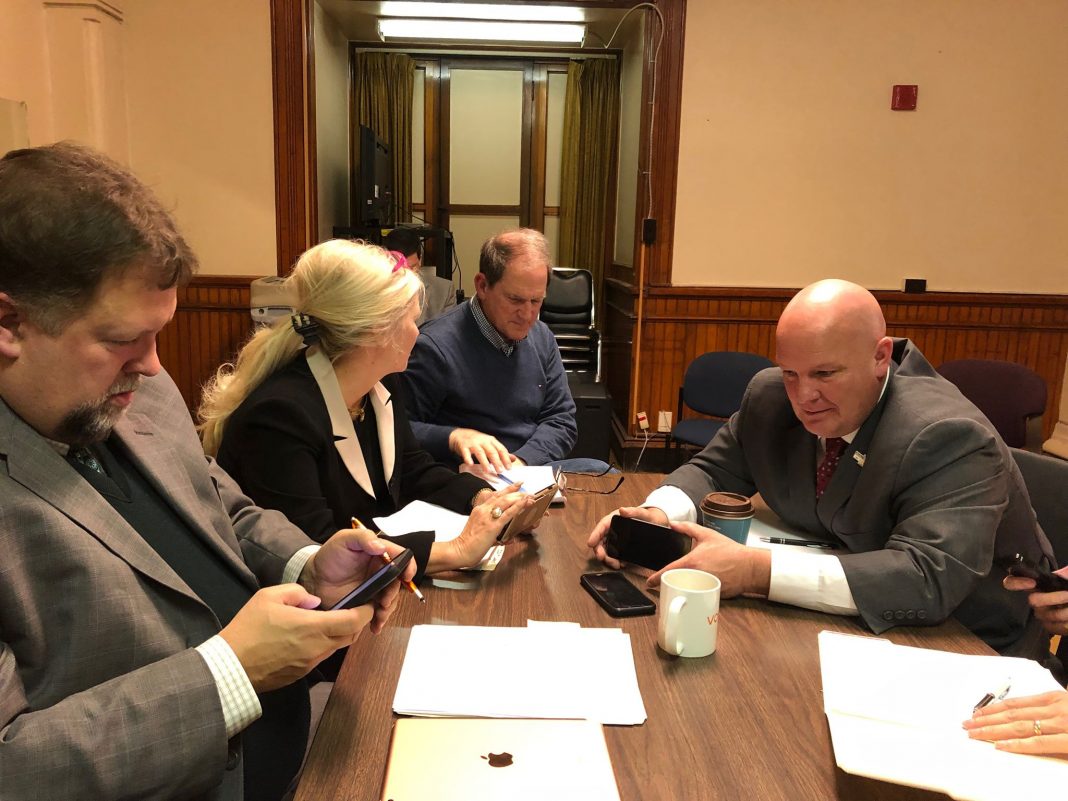Senate Joint Resolution 11 calls for a constitutional convention for the purpose of proposing an amendment to the U.S. Constitution relating to term limits for federal legislators.
“I see this having two separate, but related issues,” said State Sen. Jason Schultz. “One of them is term limits. We also have the Article 5 portion of this. I believe term limits are quite popular with a lot of people and they’re also opposed by people in both parties. An Article 5 Convention process is its own controversy with people supporting and opposing. I see this as two different issues tied together because of the process.”
Ken Quinn of U.S. Term Limits spoke in support of the resolution. He was the lone voice supporting the bill.
Quinn said during the 1990s, 23 states passed laws regarding term limits on their own members of Congress, but the Supreme Court overturned all of those state laws and ruled the only way to impose term limits on Congress is through an Article 5 Convention.
“The Framers put in another option as a way for the state to check federal powers,” Quinn said. “It allows the state to call a convention to propose an amendment.”
He stressed this convention wouldn’t be a constitutional convention, but an Article 5 Convention. The purpose, he said, is not to draft and create a whole new constitution but to add to the constitution already in existence.
“That’s a big distinction,” he said. “It’s also a limited convention and only relates to what two-thirds of state legislatures submit in the application. It is solely term limits on Congress.”
Congress, Quinn said, has introduce more than 12,000 amendments to the U.S. Constitution. This year’s Congress has already introduced 35.
“The states have never once introduced a single amendment to the U.S. Constitution under this process. All this does is give all the states the same opportunity Congress has taken advantage of 12,000 times.”
Another reason to support the legislation is the fact Congress won’t likely term limit themselves, Quinn said. Instituting term limits is the will of the people, he said.
Potential positives included having more candidates to choose from and reducing the amount of money spent in elections, according to Quinn. He also said career politicians would not be able to consume so many leadership positions on various committees in Congress.
“This will help level the playing field among the states so the states can have more of a voice throughout the country,” he said. “What we see now is in Congress those who have been there a long time hold key leadership positions. We want people to have a faster path to leadership positions.”
Schultz said he had received around 200 emails in a short amount of time from all over the state in support of the resolution.
A few folks spoke in opposition to the bill. John Strathman highlighted the fact that neither political party supports a constitutional convention in their respective platform.
Tamara Scott of Iowa Faith and Freedom Coalition and Concerned Women For America noted this fight has been going on for several years over a potential constitutional convention.
“There are large concerns on a convention and you can call it whatever you wish, but we’ve seen how rules are suspended on other issues that are brought into convention,” Scott said. “Convention of the States worked last year in 18 or 20 states and was defeated in every single one because people are not comfortable with this idea. There’s great concern with a runaway convention.”
Arkansas just passed it through a committee, Scott said, but they needed to suspend the rules in order to do so.
She pointed to the hearing on Justice Brett Kavanaugh.
“No matter what side of the aisle you’re on, you saw a lack of decorum, lack of respect for the process and a lack of respect for the Constitution itself,” Scott said. “In this divided political climate, I just can’t imagine that this body or any other body will come together and work with a new document.”
There’s no need to impose term limits, according to Scott, who said Iowans already can impose them.
“It’s called the election,” she sad. “Look no further than (David) Young, (Rod) Blum, (Mike) Gronstal,” she sad. “If you get involved and do the work, you’ll have your say in an election.”
Scott pointed to former Nebraska Sen. Bill Nelson as a potential downfall of term limits. Nelson helped push ObamaCare through prior to his retirement from the Senate. She expressed concern with potentially having a lame-duck session in every Congressional session.
“This is a risk that we cannot handle,” Scott said of a constitutional convention. “It’s the wrong tool for the wrong time.”
Tammy Kobza with Eagle Forum spoke against the resolution as well.
“It’s never been done before,” she said. “I understand the country’s frustration at what’s happening with our government oppression, but unfortunately most Americans haven’t been paying attention over the past few years, although they’re starting to.
“Many Americans for the last 100 years haven’t even been taught the most basic of civics, so they don’t understand that reigning in the federal government would be very, very doable although very hard at this point by getting Congress to adhere to the enumerated powers already listed in the Constitution.”
Kobza shared a quote from Daniel Webster that a strong conviction that something must be done is the parent of many bad measures.
“I believe that this is one of those instances,” Kobza said.
Quinn said he used to oppose a convention of the states as well. But he credited the Framers for their wisdom.
“They put this in the Constitution as a way for the states to check the power of the federal government,” Quinn said. “Article 5 Convention cannot amend the Constitution, it can only make recommendations. It still needs 38 states to ratify before a proposal can be added to the Constitution.”
He cited the public’s desire for term limits as a reason to push the bill through.
“To ignore the plea for term limits just does a disservice,” he said. “It’s a slap in the fact to the American voters. Not only that, but it’s really harming the way our country is supposed to make the necessary adjustments. If we can smear the very mechanism we’re supposed to be using to make the necessary adjustments, then I’m sorry, nothing will get changed. Things will only continue to get worse and worse.”
Kobza worried that the rules would change at a convention. Quinn asked what she bases those concerns on, noting that the Constitution requires 38 states to approve of measures.
“In the Articles of Confederation they were supposed to need 13 states to ratify an amendment and they changed it to 9 of 13,” she sad.
Democrat Sen. Todd Taylor said he’d prefer to see campaign finance reform and perhaps changes to internal party policies on leadership.
He closed his comments with a quote from Winston Churchill:
“This is the worst form of government…except for all the rest.”
Republican Sen. Roby Smith supported the bill, taking exception with lame-duck session claims.
“The Founding Fathers, I hear numerous times, were very wise men who knew what they were doing,” Smith said. “It strikes me odd that I hear that from a number of people. But when it comes to Article 5, they got it wrong. That’s what I’m hearing from people.
“Now, I don’t think they got it wrong because this empowers the people and in the end it goes to the people.”
He also said any potential runaway convention would be ineffective because amendments still need to be approved by 38 state legislatures.
Schultz signed off on the resolution too in order to keep the measure alive.
“I’m not seeing this go all the way through the system to be quite honest,” he said. “I do think there will be those for and against who will be very activated if we move forward.”
He’s hopeful that the resolution can garner enough attention to send a message to Congress.
“The image of this going forward is not that we will reach the desired number of states or the required number of states in order to force a Convention of the States,” he said. “What I see happening is Congress sees the number keep rising and realizes should they do nothing, and the states do reach the critical mass, then they could end up losing control and I don’t think they’ll allow that to happen.”
Schultz said there are other potential resolutions that will call for a convention. And he said it may be necessary to have another subcommittee on this resolution.
“What we’re looking for is the activation of the people to make enough noise that the federal government notices it,” he said. “I’m willing to sign it so it doesn’t die today. But I do want to leave open the possibility that we have a much larger (subcommittee).”












